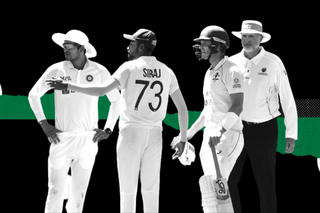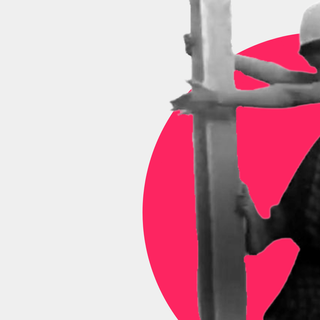
Athletes Are Calling Out Racist Trash Talk in Real‑Time, Forcing Sporting Culture to Adapt
Players like cricketer Mohammed Siraj are challenging the traditional advice to ignore racist abuse.

Trash talk went one step too far in Australia this weekend, when a group of fans at the Sydney Cricket Ground (SCG) hurled racist abuse at Indian cricketers Mohammed Siraj and Jasprit Bumrah on the boundary line. Upon hearing offensive statements and terms such as, “You brown dog, go home,” and “Monkeys,” Siraj held up the game to file a complaint with the umpire. As the incident blew up on social media, Cricket Australia issued public apologies for the behavior of Australian fans and has since launched a probe into the racism in the stands — a reality Indian cricketers have long known to be a part and parcel of playing in Australia.
Responding to the incident, Indian men’s cricket captain Viral Kohli tweeted, “Having gone through many incidents of really pathetic things said on the boundary lines, this is the absolute peak of rowdy behavior.” One example occurred in 2012 when Kohli famously showed the middle finger to an Australian crowd in response to fan abuse and was fined by the International Cricket Council.
Many other cricketers also described how normalized racial abuse is in cricket, falling into the highly normalized phenomenon of ‘trash talk’ — a historically tolerated, even accepted, part of sporting culture that usually flies under the radar. “When I toured back in 2011-12, I had no idea how small you can be made to feel in front of so many people. People laugh at you when you are getting abused,” Indian men’s team’s star spinner, Ravichandra Ashwin, said in a press conference. “It is definitely not acceptable in this day and age. We have evolved as a society, but this reflects the upbringing of those individuals.”
The latest incident at SCG signals a shift in how the world deals with racial abuse in sporting culture. Trash talk is an age-old practice in sport, with the race, gender, appearance, talent, or skill of the opposition (player or fan) up for grabs. But while berating an opposition player or fan for their skill, talent, or team’s performance may be something that falls squarely within the ambit of displaying a healthy, competitive spirit, players are increasingly calling out the more insidious insults, especially ones that attack a player’s identity, and holding such white, heterosexual hegemony accountable. And they’re doing it in real-time.
Racist trash talk, to be sure, is targeted at Black and Brown athletes not just in cricket, but also in most other sports. Many athletes, at encountering such normalized abuse, however, are conditioned to continue their play; seeing as how advice about how to deal with all trash talk (even which includes racism) has always been to dust it off, take it in one’s stride, ignore. It happened in 2019 with footballer Romelu Lukaku, when fans targeted him with chants of “monkey” while he waited to take a penalty for his club, Inter Milan. All Lukaku could do at the moment was stare at the fans, before scoring a successful penalty — and then raise concerns about the racist behavior off the pitch. Speaking to the New York Times in an interview later, he had said, “I’ve been confronted by it many times in life. You build a type of shell. I take my anger out on the field.”
Related on The Swaddle:
New Report Outlines Scale of Homophobia, Transphobia in Sport
“We always think of sports as being very physical games, but they are absolutely mental games,” says communications scholar Karen C.P. McDermott, Ph.D., who has researched trash talk in sport. “Having that mental edge and being mentally focused is incredibly important, especially in sports that require hand-eye coordination. There’s always that mental component and trash talk is another form of offense that athletes have to play defense against.”
In a study she conducted on the effects of trash talk in video gaming, McDermott gives an insight into the psychology of the athlete targeted by trash talk: “What I found actually is that anger and shame were related to each other. People didn’t feel one or the other, they tended to feel both. In many cases what happened was that people felt shame more strongly and it made them angry. That affected their performance.”
The effect of trash talk — even the more benign kind — is often compounded for Black and Brown athletes, who suffer disproportionately high rates of harassment and abuse, and are made to feel like outsiders in many elite sporting spaces that are white-dominated. As Scotland cricketer Priyanaz Chatterji told the BBC, “It’s this idea that you, as a white person, are the default; you are the norm and anyone who deviates from that has to be justified and explained.” When making it in sport is riddled with obstacles because of one’s appearance, race, or sexuality, trash talk that focuses on those exact attributes can serve as yet another reminder for not belonging, which can become a more intense source of anger and shame for Black and Brown athletes.
The suppression of this shame and anger, then, is a highly detrimental, yet normalized phenomenon among Black and Brown athletes, encouraged by the rest of the sporting world imploring them to rise above. This, history shows, has led to outbursts on the field — cue Kohli’s middle-finger moment — that eventually ends up hurting the cricketer of color only. It’s indicative of how the world of sports views trash talk — as being normal, harmless, in jest, no matter how abusive it may become. It’s as if the culture of sports is ripe for racism and sexism to blossom in the guise of trash talk, giving fans and players alike a free pass because they’re being bigoted in the name of the spirit of competition, and because it’s a space in which anything goes. The shared reality of being part of a sport that values competitiveness, then, forces individual players to swallow any violations to their dignity, lest they compromise what they have in common. Unfortunately, this burden mainly falls on Black and Brown athletes, because they’re considered to have more identity markers that carry a long history of oppression, and within it, a robust vocabulary that is then weaponized against them.
McDermott says the scientific community hasn’t adequately researched the mental effects of trash talk on players, which has then led to a lack of players’ ability to build a psychological defense against it. For Black and Brown athletes, this trash talk often takes the form of racial abuse, making something that’s considered normal in the world of sport actually a reflection of the prejudices we hold in the rest of society. The most recent example shows, however, that expecting players to build up a defense against racist abuse flung at them may not be the way to go. The problem is institutional — in cricket, football, boxing — and so need to be the solutions.
In recent years, we see a more progressive, outspoken outlook toward racist trash talk playing out in sports, fueled by athletes who’re willing to stop play and stand up for themselves, both on and off the pitch. In football, the most recent example is the Champions League game between Paris Saint-Germain and Istanbul Basaksehir, in which all players of both teams walked off the pitch at the 23rd minute to protest Romanian referee Sebastian Coltescu’s use of the N-word to refer to a Cameroonian assistant from Istanbul’s side. Slowly, but steadily, the normalization of racial abuse disguised as trash talk is being brought to light, another example of which is Conor McGregor’s repeated run-ins with the brass at Ultimate Fighting Championship. He has been constantly checked, and in some instances, penalized, for racist and sexist remarks on social media and in press conferences.
At the end of the day, however, it may be individuals hurling racist trash talk at Black and Brown athletes, but it’s the sporting institutions that are tolerating it. Unfortunately, for now, it falls on the same Black and Brown athletes to interrupt their work to call racism out, a reality an increasing number of athletes are embracing.
As Ashwin said, “Even yesterday when Siraj brought it up, Ajinkya, myself, and Rohit got together and went to the umpire and did report it. Nowadays the boys are better equipped and aware. Even Siraj, who is new, does know that this is the line you cannot cross. It is a wonderful thing.”
Rajvi Desai is The Swaddle's Culture Editor. After graduating from NYU as a Journalism and Politics major, she covered breaking news and politics in New York City, and dabbled in design and entertainment journalism. Back in the homeland, she's interested in tackling beauty, sports, politics and human rights in her gender-focused writing, while also co-managing The Swaddle Team's podcast, Respectfully Disagree.
Related


Telangana Women Become First Female Linemen for State Power Company
